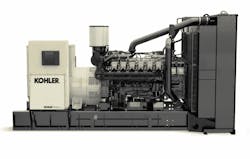Biofuel Breakthrough: Kohler Diesel Gen-sets all can now run on Hydrotreated Vegetable Oil
The market potential for biofuels to contribute to the resiliency of the lower emissions energy transition may be bigger than even its champions imagined.
Various forecasts predict that the global revenue for biodiesel, renewable natural gas and other biofuels could grow close to 20 percent higher to above $200 billion by 2030. The driver for expansion is the need for baseload-type reliability to support microgrids that might include solar, storage and other intermittent renewables.
One of the biggest players in the on-site, backup generator market, Kohler Power Systems, announced Wednesday that its entire fleet of mission-critical diesel generators can now run on hydrotreated vegetable oil (HVO). The biofuel breakthrough does not require any adaptations for the installed generators, the company said.
The emergence of generator-ready HVO makes use of plant stock and improves the greenhouse gas emissions profile compared with diesel generators, the company said. Feedstocks can include canola, algae, palm oil and tallow.
“At Kohler, we have already made great strides in making our generators inherently more efficient, reducing emissions regardless of the fuel used,” says James Zhang, President, Kohler Power Systems. “The HVO fuel option supports Kohler’s commitment to our Better Planet strategy within the Believing in Better operating philosophy that focuses on overarching environmental goals.”
On-site gen-sets are a key component for any mission-critical facility, whether it be data centers, military bases, public safety centers or anywhere a multi-faceted microgrid is installed. They offer electricity capacity even during an extended utility grid outage or weather events making renewable energy unavailable.
According to Kohler Power Systems, the biofuel option offers advantages even over the time-tested diesel fuel resource. While first-generation solutions had a limited storage life of just six months, HVO is highly stable, with no sensitivity to oxidation, so it can be stored long-term. It is also 90% carbon neutral and sourced entirely from waste products – making it part of a circular economy.
The similarity in HVO and fossil diesel characteristics further smooths the shift to biofuel because the two fuels can be mixed directly in the tank without issue. Therefore, it can be used immediately as the sole fuel supply for all Kohler diesel generators, whether they are brand new or previously installed and in operation.
Biofuel engines also can be part of combined heat and power (CHP), or cogeneration plants used to provide electricity, heating and cooling to college campuses, industrial manufacturing and district heating facilities.
On-site generators for data centers are a key market for Kohler Power Systems. Last year, it announced investments to upgrade a French facility where it makes close to 17,000 generators a year.
-- -- --
(Rod Walton, senior editor for EnergyTech, is a 14-year veteran of covering the energy industry both as a newspaper and trade journalist. He can be reached at [email protected]).





